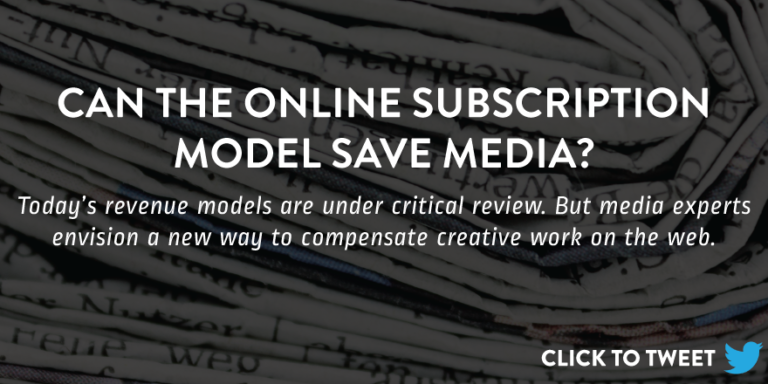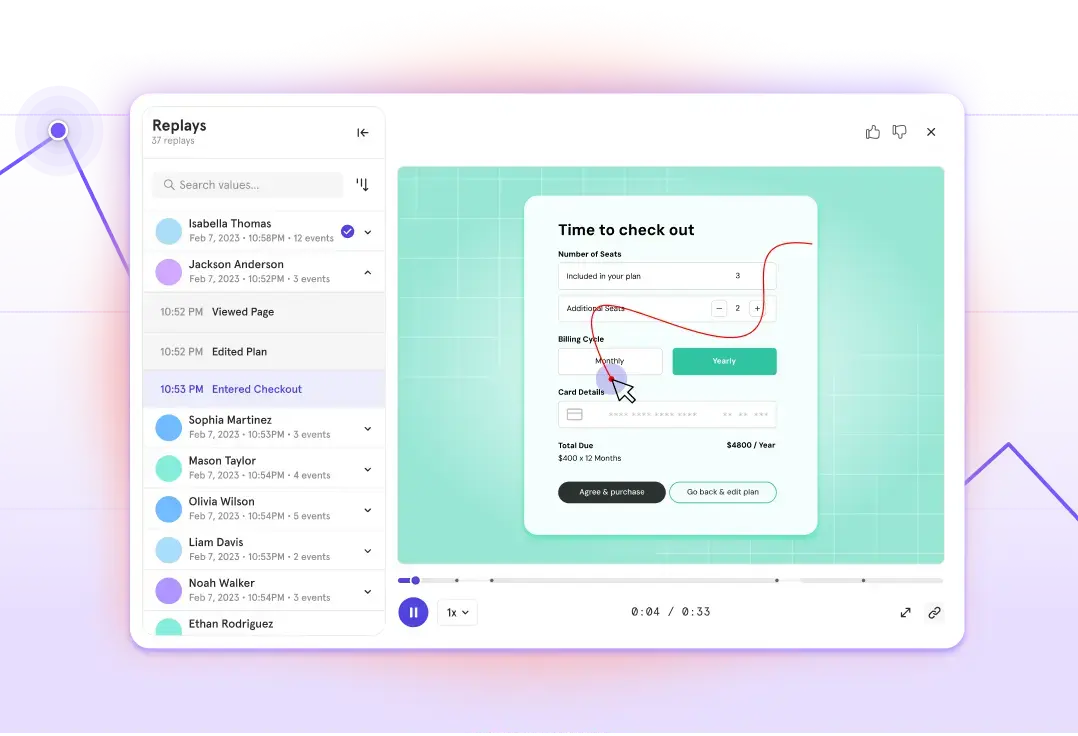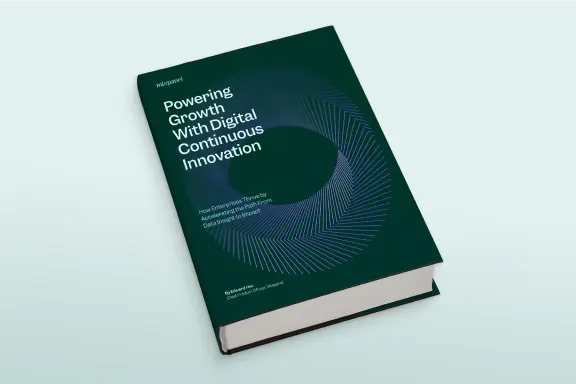Beyond the ad: Three media experts discuss revenue models
Medium, the internet’s blank canvas to self-publish, has been empowering anyone and any company to tell stories since 2011. With a total of $132 million in funding, it’s been a darling of new media, with accessible, simple and high-quality content. Yet despite notable success, Medium laid off 50 employees at the start of the year because its business model wasn’t making money.
In response to the layoffs, Ev Williams told Re/code, “We are shifting our resources and attention to defining a new model for writers and creators to be rewarded, based on the value they’re creating for people. It is too soon to say exactly what this will look like.”
This is not new news. Digital media companies have been struggling with this same problem since the dawn of the internet. In fact, compensating creatives has been an age-old conundrum. How do you assign monetary value to creative or journalistic work?
At The Signal, we’ve met with several product leaders across different sectors and on different occasions heard a similar trend from them all – technology platforms have a responsibility to figure out a new compensation model.
Is our economy moving away from an ad-based revenue models? Is tomorrow a subscription-based economy only for creatives and consumers? Or is there another way to compensate creative work on the internet?
We’re asking the experts across venture capital, media, and fintech to weigh in on this complicated business problem: how do we monetize creative work on The Internet?
First, meet the panel:
- Hunter Walk, co-founder and venture capitalist of Homebrew, seed stage investor for theSkimm, former product leader at YouTube and Linden Labs (creator of Second Life)
- Ellen Chisa, product leader at Lola, former PM at Kickstarter
- Nick Rockwell, Chief Technology Officer at The New York Times
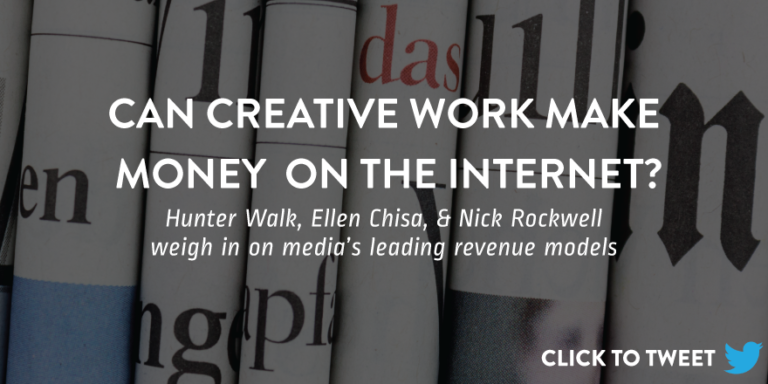
Are readers, the media, and our economy beyond the ad-based revenue model? Is the Internet too saturated with content for creatives to be compensated fairly?
Hunter Walk: It’s… complicated. I truly believe there’s never been a better time to be a creator. You have more tools, more direct ways to reach an audience and more ways to earn a subsistence living than at any point in history. But it also requires a set of skills that go beyond core creation. You need to be a marketer, an entrepreneur, a community leader in addition to being a creative. And, man, that’s a grind.
At the same time there’s definitely a decrease in creative employment opportunities in fields like journalism – if you define “employment” as well-compensated, full-time jobs with benefits and stability. Some of this is from middlemen being disintermediated; some of this is from technology-aided productivity gains; some of this from changes in the advertising structure which supported journalism and the commerce system which supported music; and some is from abundance of content as you noted.
Ellen Chisa: I don’t think the internet is too saturated for fair compensation. I think we need different models for different types of content. I do think the bar for content that is high enough quality to be compensated in a way we consider “fair” may move. No one thinks Pulitzer Prize-winning journalism is the same thing as clickbait.
Right now, we have a few types of revenue models: First, there’s content that reaches a huge audience, which can be supported by advertising. Then there’s tightly focused content can be supported by few, high-paying customers (ex: industry trend reports for travel from PhocusWright, comparable reports for finance). Right now there’s a gap in the middle.
Today there is content that is supported by people, but not worth huge one-off purchases. I do think crowdfunding is one model in this space, and it works well for bigger projects such as books. This hasn’t translated as well to blogs or essays yet.
I am a fan of Ann Friedman’s tinyletter where she charges $5/year to get the pie charts she creates. It’s a subtle reminder every time you read the newsletter whether or not you’ve financially supported her work or not.
Nick Rockwell: I think sustaining a media business on the ad model alone is hard. It’s doable for large ones, and small ones, but hard on the middle. There is a big swing happening towards subscription models, which will be hard too, but at least more aligned. For both publications and writers, compensation is uneven, so no, it isn’t fair, and it will be very tough on everyone.
How should the internet determine its new “value” exchange, as Ev mentioned? Should users be responsible for compensating the artist or the platform?
Walk: Any platform which doesn’t think proactively about how to compensate the creators on their platform is inherently at risk. It’s not enough to let these creators go and find third-party solutions to monetize. Rather you need to be facilitating, or even building, the monetization tools, the advertiser demand, the commerce opportunities, and so on. This was core to the YouTube strategy from early on and I believe has played an important role in its enduring growth.
Chisa: I think that there will be some of both. As an independent creator, I’d rather build directly with my audience. While it might take time to build up, it’s much less likely to be at risk as compared to a platform that can change direction or go away. That said, there is definitely an ease of use when the platform helps to aggregate those individual contributions.
In your opinion, what’s the perfect formula to monetize the internet and creatives’ work, whether journalists, artists, or digital creatives?
Walk: There is no perfect formula and no silver bullet. Platforms and consumers need to understand that if they’re not supporting creators, the creators will disappear. So you need to vote with your wallet, not just your attention. I do believe many services are afraid to ask consumers to pay directly for content, either in traditional (subscription) or less traditional ways (such as patronage).
Chisa: I think the best way to find a “perfect formula” is to figure out where value is being created, and then allow creatives to capture part of that value. But still, I don’t know if I can call this a “perfect” formula.
The first thing we need to do is to get away from the idea that artists don’t have integrity if they get paid for their work. Artists need to get paid for their work. After that, I think it depends.
A platform captures some value by having well regarded writers, and/or good content available. With a platform, an artist can have a destination and then are able to build a brand. That’s pretty direct, and how things used to work.
Individual consumers of content capture value in two ways. One way is enjoying it and looking at it, which is basically what ad monetization is. The one I’m more interested in is when individuals integrate other creative work into their thoughts and use it as one of many inputs into their later work. I wish there was a better way to see influence of ideas over time, so we could see which generated more value. Academic citations work that way, but we don’t have something nearly as robust for the web.
Rockwell: I think that pure subscription or membership models are best, but few can pull it off. It’s hard to say no to the ad model, and using ads and subscription together is okay. The model alone is very hard.
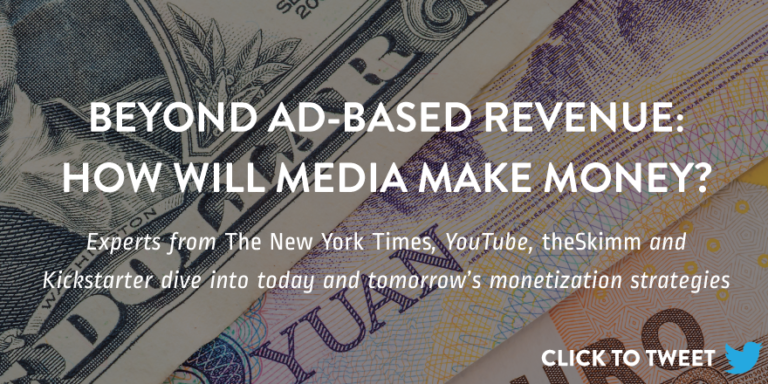
What are the new revenue-models for today’s internet?
Walk: I’m really impressed by how our investment theSkimm has built its revenue structure. TheSkimm’s mission is to help you be smarter about the world around you. Leading first with a free daily newsletter (sponsored by brand advertisers) that reaches millions of people each day. Next came a subscription app ($2.99 a month) which focuses on what you need to know in the near-future. Less than a year after launch it’s a seven figure revenue stream. Next you’ll see some other models in video and commerce, which are consistent with their mission and values. There’s no one silver bullet.
Chisa: Totally agree with Hunter about TheSkimm. I subscribe to support the company/newsletter product even though I still read the newsletter more often than I use the forecasting app. Plus I want to be in the know for anything new! I also like Ann Friedman’s method mentioned above, and Stratechery, which is pure subscription.
Rockwell: I believe that before we go discovering new revenue models, we need to focus on being subscription first.
What sort of shift do you expect to see from media companies and social networks across the internet when it comes to their business models?
Walk: Here are a few of my predictions:
- The increase in recognition that creators need to get paid. Vine, for example, should have focused on this earlier and I’d be surprised if Instagram isn’t also thinking about this question.
- More ways for “true fans” to support their creators directly – subscription newsletters, branded commerce, Patreon-like sponsorship and crowdfunding. Even altcoins!
- Creator burnout and platforms coming up with ways to help address not just the monetary side of being a creator, but the emotional side. YouTube thinks about this in terms of creating community among creators, running education events, recognizing creator success through trophies for hitting different levels of subscriber-based and so on.
Chisa: I’m hoping for better discovery. Right now it can be easy to find the big names that are already popular on media platforms, or to find the people that you already know. There’s not much in the middle for niche creators – that same gap that I see in the business model. I’m not sure this is a “prediction” as much as it is a hope. I think landing that would help increase engagement (and advertising dollars) and create another space that people would be willing to pay for.
Rockwell: Social networks are doing fine—advertising is working for them and charging for service can be very dangerous in those cases. For media, I think their business models will change more and more toward subscriptions, and lots of attempts to bundle up and aggregate subscriptions.
How do you see data helping creative work being compensated more in the future?
Walk: I don’t think data in and of itself is as helpful to creative work and helping creators glean insights from the data. Media companies need to help translate what data means, and not just just present a dashboard.
On the payments side there’s also a bunch of startups – some built on blockchain, some more traditional accounting – being started to try and help creators follow the money and get appropriately paid ASAP for their creations, no matter where they travel.
Chisa: I think we’re going to get to a point where we have “better” data. Ev mentioned this early on with Medium – the goal was to give writers ideas about quality (read % and recommends) rather than just the vanity metric of page views. I think as businesses use more meaningful metrics to track their success, those will be passed on to individual creators.
Rockwell: Not much relative to today, but data is a way to keep score. Subscription businesses need to take a longer view. That perspective will provide some incentive against clickbait, which is good, and should reward creators of quality work.
